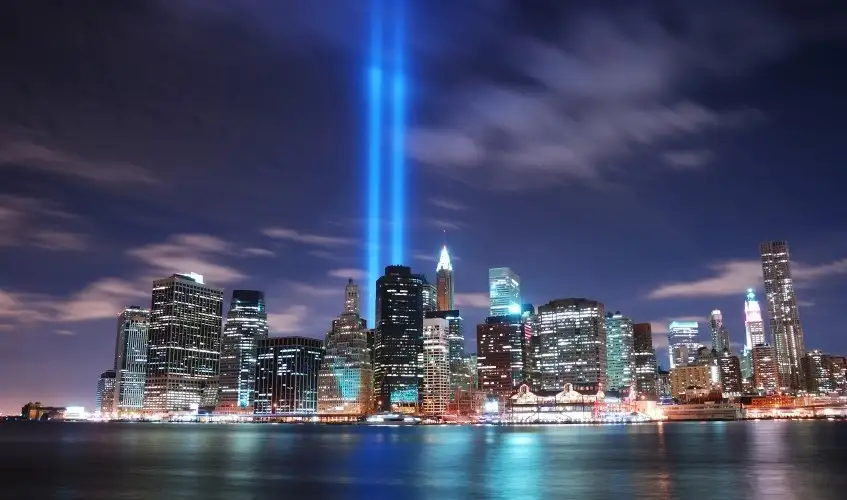
The human toll of 9/11 numbered in the thousands, and the emotional toll remains forever immeasurable. As survivors, family members, and friends of the victims pause to mark a somber anniversary of personal grief, others of us reflect on what that terrible day has meant to our everyday lives. Now, 10 years on from the attacks that brought down the Twin Towers and devastated the Pentagon, the long-term, mundane impact on the way we travel is surprisingly clear: September 11, 2001, casts a shadow over every aspect of our air travel experience.
The predominant issue for many of us after 9/11 was, of course, fear. Fear of flying. Fear of another attack. Fear of our fellow passengers. The fear has subsided now—most people probably aren’t as afraid to fly today as they were when commercial air travel resumed after the attacks—but an even more insidious problem has replaced it. Now the biggest issue is a practical one: Flying is a hassle. It’s inconvenient, overcrowded, and overpriced. And it’s become such an annoyance that many people opt not to fly at all—or at least not when they can avoid it.
It’s not hard to understand why when you consider these five developments that stem either directly or indirectly from the events of 9/11.
- Airport security was something of any oxymoron before September 11. It was there, sure, and we all had to pass through it—but it wasn’t the centerpiece of our collective air travel experience. All that changed with the creation of the Transportation Security Administration (TSA) in November 2001. Because of 9/11 and the subsequent failed attacks by the so-called “shoe bomber” and “underwear bomber,” airport security lines move slower and extend longer than ever before. Our shoes, our laptops, and even our toiletries are under perpetual scrutiny. And we’ve even had to bid farewell to the simple pleasure of greeting or saying goodbye to our loved ones at the gate.
- Civil liberties at the airport have also suffered. What once seemed like science fiction (full body scanners) and the exclusive domain of a police state (invasive body searches) are fixtures at airports across the country. Our checked bags are routinely X-rayed now, too. Truly, nothing is private anymore.
- The economic strain felt by the airlines in the wake of the 9/11 attacks also paved the way for some of the least consumer-friendly developments of the last decade, including airline mergers, bankruptcies, and outright liquidation. Coupled with economic pressures from other corners, one of the chief long-term effects has been reduced passenger capacity due to scaled-back schedules. Planes are fuller, our choices are diminished, and there’s not a lot of elbow room left in coach. Some airlines have even added extra seats to cram us all in even tighter.
- Another side effect of those economic woes: rampant fees. From seat selection to a warm blanket—not to mention the September 11th Security Fee itself—the culture of fees owes at least part of its origin to the shadow cast by 9/11. Even the now-ubiquitous bag fee—non-existent before the attacks—is today as much a fixture of the air travel experience as the safety video and in-flight magazine. Commercial air travel suffered a catastrophic blow in 2001, and it didn’t take long before that pain was passed along to us.
- And then there are the fuel surcharges tacked on to a carrier’s “base fare.” Put in place by the airlines to offset—some might say conceal—the rising cost of fuel, their ties to 9/11 may not be immediately obvious until you think about where much of that fuel comes from. Oil prices rise and fall based on demand and availability, and few things affect price stability quite like the turmoil of war in the Middle East.
Readers, what do you think? Has 9/11 changed the way you travel? Have you altered your vacation plans to travel by car, bus, or rail? Have you noticed any changes to travel outside of the airport? Share your thoughts and comments about post-9/11 travel below.
Additional Links:
- The long-awaited opening of the 9/11 Memorial gives travelers a new reason to visit New York City, writes SmarterTravel’s Senior Editor, Christine Sarkis.
- SmarterTravel’s Editor-in-Chief, Ed Passarella, was traveling overseas during the 9/11 attacks. We published his essay, News from America, shortly after September 11.
- TravelPod, one of our sister sites within the TripAdvisor Media Network, has put together an infographic about the impact of 9/11 on travel.
We hand-pick everything we recommend and select items through testing and reviews. Some products are sent to us free of charge with no incentive to offer a favorable review. We offer our unbiased opinions and do not accept compensation to review products. All items are in stock and prices are accurate at the time of publication. If you buy something through our links, we may earn a commission.
Related
Top Fares From
Today's Top Travel Deals
Brought to you by ShermansTravel
Kenya: 14-Night Tour, Incl. Tanzania &...
smarTours
 vacation
$7125+
vacation
$7125+
7-Night Caribbean Round-Trip Cruise From Orlando:...
Norwegian Cruise Line
 cruise
$739+
cruise
$739+
Ohio: Daily Car Rentals from Cincinnati
85OFF.com
 Car Rental
$19+
Car Rental
$19+



